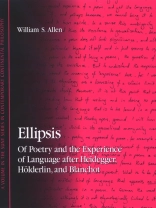Examines poetic language in the work of Heidegger, Hölderlin, and Blanchot.
What is the nature of poetic language when its experience involves an encounter with finitude; with failure, loss, and absence? For Martin Heidegger this experience is central to any thinking that would seek to articulate the meaning of being, but for Friedrich Hölderlin and Maurice Blanchot it is a mark of the tragic and unanswerable demands of poetic language. In Ellipsis, a rigorous, original study on the language of poetry, the language of philosophy, and the limits of the word, William S. Allen offers the first in-depth examination of the development of Heidegger’s thinking of poetic language-which remains his most radical and yet most misunderstood work-that carefully balances it with the impossible demands of this experience of finitude, an experience of which Hölderlin and Blanchot have provided the most searching examinations. In bringing language up against its limits, Allen shows that poetic language not only exposes thinking to its abyssal grounds, but also indicates how the limits of our existence come themselves, traumatically, impossibly, to speak.
Inhoudsopgave
Acknowledgments
Abbreviations
Introduction
Part One: The Mark of a Poem
1. Repeat: The Experience of Poetic Language
The Turning of
Logos
Saying the Same
The Limit of Writing
Again, Anew
2. Hiding: Figures of Cryptophilia in the Work of Art
Earth and
Phusis
Draw-ing and
Polemos
Poetry and
Logos
Thesis: Stellen:
Peras
3. Beyond: The Limits of the Word in Heidegger and Blanchot
The Reading of the Word
The Writing of the Word
The Position of the Word
Part Two: The Repetition of Language
4. Suspending: The Translation of Tragedy in Hölderlin’s Essays
The Chiasmic Ground of
Empedocles
The Caesura of
Oedipus
The Eccentricity of
Antigone
The Rhythm of
Dysmoron
5. A Void: Writing and the Essence of Language
Bearing Out
The Pain of Language
Into the Space of Renunciation
In Palimpsest
6. Fragmenting: L’iter-rature of Relation
‘Without return’
…
‘Never repeat’
(Refrain)
Notes
Index
Over de auteur
William S. Allen is an independent scholar who received his Ph D from the University of Warwick, England.












